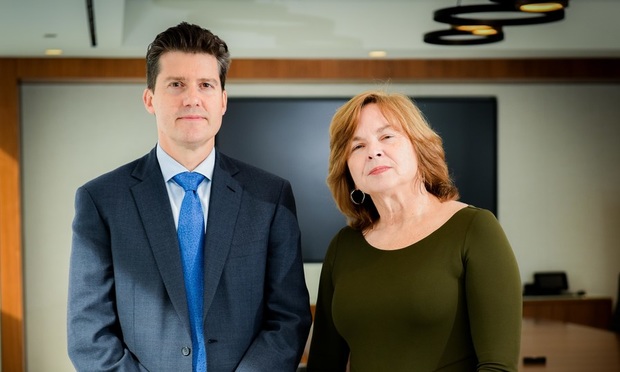Judge Dismisses Suit Against Quinn Emanuel by Partners of Spinoff, Sends to Arbitration
If the decision isn't challenged or upheld on appeal and Quinn Emanuel prevails in arbitration, Selendy & Gay partners could be forced to turn over 10 percent of the fees they bill to former Quinn Emanuel clients.
April 24, 2019 at 05:41 PM
4 minute read
The original version of this story was published on New York Law Journal
 Philippe Selendy and Faith Gay, the name partners of Selendy & Gay in New York City. Photo: David Handschuh/ALM
Philippe Selendy and Faith Gay, the name partners of Selendy & Gay in New York City. Photo: David Handschuh/ALM
A New York state judge has rejected a request by partners of Selendy & Gay to halt Quinn Emanuel Urquhart & Sullivan's arbitration case against them, ordering the offshoot law firm to face Quinn Emanuel's claims in arbitration.
Partners at Selendy & Gay had argued that Quinn Emanuel's effort to make them turn over a share of the legal fees they took with them violated state ethics rules, but Manhattan Supreme Court Justice Saliann Scarpulla ruled this week she could not evaluate that dispute.
Dismissing the case, she said the arbitration clause in Quinn Emanuel's partnership agreement required her to let the arbitrator make that call.
“It is for the arbitrator in the first instance to [determine] whether the provision at issue is an unenforceable forfeiture-for-competition clause,” the judge wrote. “Any further inquiry on my part is precluded by the broad arbitration provision and the strong public policy compelling its enforcement.”
The petition was brought by 10 partners at Selendy & Gay who spun off from Quinn Emanuel last year to form the firm. Their petition sought to shut down an arbitration proceeding initiated by their former firm in California over a provision in the partnership agreement that required them to turn over 10 percent of the fees they earned in the 18 months after their departure from clients who followed them from Quinn Emanuel.
They had argued that New York courts have declined to enforce partnership terms that require departing attorneys to pay penalties if they compete with their former firms, citing cases such as Cohen v. Lord, Day & Lord and Denburg v. Parker, Chapin, Flattau & Klimpl. The judge acknowledged both cases in her opinion.
But Justice Scarpulla said the law on arbitration of such disputes was on Quinn Emanuel's side. In a pair of decisions in the 1990s in the case of Hackett v. Milbank Tweed Hadley & McCloy, she wrote, New York's highest court sent a similar dispute to arbitration.
“In accordance with Hackett and Hackett II, the public policy issue here … does not overcome the broad arbitration provision, which must be given effect as overriding policy,” the judge wrote. “Petitioners' argument to the contrary—that the provision at issue here is facially anticompetitive and therefore, distinguishable from Hackett and Hackett II—is unpersuasive.”
The decision could come at a cost for Selendy & Gay, which lists 36 lawyers on its website. The firm launched about a year ago, and in December it announced it would pay associates some of the biggest bonuses in the industry.
If the decision isn't challenged or upheld on appeal and Quinn Emanuel prevails in arbitration, Selendy & Gay partners could be forced to turn over 10 percent of the fees they bill to former Quinn Emanuel clients in the 18 months after their departure from the firm.
In an emailed statement, Phillip Beck of Bartlit Beck, which represented Selendy & Gay's partners alongside the firm of Vladeck, Raskin & Clark, saw a silver lining in the decision. He noted that the judge acknowledged his side's arguments that Quinn Emanuel was simply using the fees provision as a cudgel to convince Selendy & Gay to not try to poach its associates.
“The court held merely that these arguments should be presented in the first instance in arbitration,” he said. “We are confident that, whether in the courts or arbitration, ultimately QE's forfeiture provision will be held to be illegal, unethical and unenforceable.”
In its own statement, Quinn Emanuel, which was represented by its own partner, Andrew Rossman, hailed the decision.
“We're pleased that the court dismissed the Selendy lawsuit and agreed that the arbitration provision of the partnership agreement should be enforced,” the firm said. “It was, after all, what the partners agreed to.”
Quinn Emanuel founder John Quinn previously told ALM that he wasn't too worried about the dispute. “Last year was the best year we have ever had and, by reports, they have done well also,” he said in an email for a February article. ”The dispute is only about money and will eventually be resolved one way or another for an immaterial amount.”
The judge instructed the clerk to enter judgment in Quinn Emanuel's favor and close the case.
This content has been archived. It is available through our partners, LexisNexis® and Bloomberg Law.
To view this content, please continue to their sites.
Not a Lexis Subscriber?
Subscribe Now
Not a Bloomberg Law Subscriber?
Subscribe Now
NOT FOR REPRINT
© 2025 ALM Global, LLC, All Rights Reserved. Request academic re-use from www.copyright.com. All other uses, submit a request to [email protected]. For more information visit Asset & Logo Licensing.
You Might Like
View All
How Some Elite Law Firms Are Growing Equity Partner Ranks Faster Than Others
4 minute read
Law Firms Expand Scope of Immigration Expertise Amid Blitz of Trump Orders
6 minute read

Strategic Pricing: Setting the Billable Hour at the Intersection of Psychology, Feedback and Growth
Trending Stories
- 1Public Notices/Calendars
- 2Wednesday Newspaper
- 3Decision of the Day: Qui Tam Relators Do Not Plausibly Claim Firm Avoided Tax Obligations Through Visa Applications, Circuit Finds
- 4Judicial Ethics Opinion 24-116
- 5Big Law Firms Sheppard Mullin, Morgan Lewis and Baker Botts Add Partners in Houston
Who Got The Work
J. Brugh Lower of Gibbons has entered an appearance for industrial equipment supplier Devco Corporation in a pending trademark infringement lawsuit. The suit, accusing the defendant of selling knock-off Graco products, was filed Dec. 18 in New Jersey District Court by Rivkin Radler on behalf of Graco Inc. and Graco Minnesota. The case, assigned to U.S. District Judge Zahid N. Quraishi, is 3:24-cv-11294, Graco Inc. et al v. Devco Corporation.
Who Got The Work
Rebecca Maller-Stein and Kent A. Yalowitz of Arnold & Porter Kaye Scholer have entered their appearances for Hanaco Venture Capital and its executives, Lior Prosor and David Frankel, in a pending securities lawsuit. The action, filed on Dec. 24 in New York Southern District Court by Zell, Aron & Co. on behalf of Goldeneye Advisors, accuses the defendants of negligently and fraudulently managing the plaintiff's $1 million investment. The case, assigned to U.S. District Judge Vernon S. Broderick, is 1:24-cv-09918, Goldeneye Advisors, LLC v. Hanaco Venture Capital, Ltd. et al.
Who Got The Work
Attorneys from A&O Shearman has stepped in as defense counsel for Toronto-Dominion Bank and other defendants in a pending securities class action. The suit, filed Dec. 11 in New York Southern District Court by Bleichmar Fonti & Auld, accuses the defendants of concealing the bank's 'pervasive' deficiencies in regards to its compliance with the Bank Secrecy Act and the quality of its anti-money laundering controls. The case, assigned to U.S. District Judge Arun Subramanian, is 1:24-cv-09445, Gonzalez v. The Toronto-Dominion Bank et al.
Who Got The Work
Crown Castle International, a Pennsylvania company providing shared communications infrastructure, has turned to Luke D. Wolf of Gordon Rees Scully Mansukhani to fend off a pending breach-of-contract lawsuit. The court action, filed Nov. 25 in Michigan Eastern District Court by Hooper Hathaway PC on behalf of The Town Residences LLC, accuses Crown Castle of failing to transfer approximately $30,000 in utility payments from T-Mobile in breach of a roof-top lease and assignment agreement. The case, assigned to U.S. District Judge Susan K. Declercq, is 2:24-cv-13131, The Town Residences LLC v. T-Mobile US, Inc. et al.
Who Got The Work
Wilfred P. Coronato and Daniel M. Schwartz of McCarter & English have stepped in as defense counsel to Electrolux Home Products Inc. in a pending product liability lawsuit. The court action, filed Nov. 26 in New York Eastern District Court by Poulos Lopiccolo PC and Nagel Rice LLP on behalf of David Stern, alleges that the defendant's refrigerators’ drawers and shelving repeatedly break and fall apart within months after purchase. The case, assigned to U.S. District Judge Joan M. Azrack, is 2:24-cv-08204, Stern v. Electrolux Home Products, Inc.
Featured Firms
Law Offices of Gary Martin Hays & Associates, P.C.
(470) 294-1674
Law Offices of Mark E. Salomone
(857) 444-6468
Smith & Hassler
(713) 739-1250










